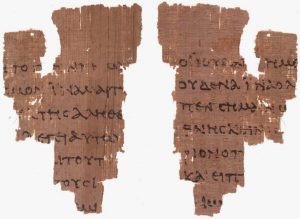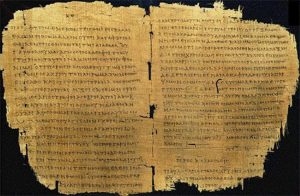Bible Verses Missing in Modern Translations?
By Steve Ray (PDF version here)
There are a lot of people today that are what we call “King James only“ Christians. They believe that the King James Version (KJV) of the Bible is the only inspired version and that modern translations are modernist. One argument for this is that there are some verses contained in the KJV which are not in recent modern versions.
The argument of KJV-only adherents only betrays their ignorance of the process of inspiration, transmission and translation. We sometimes joked that, “If the KJV was good enough for St. Paul, it is good enough for me.”
Examples of missing verses and passages are Matthew 17:21, Mark 16:9–20, John 5:4, Acts 8:37, and 1 John 5:7.

-
Save
The more ancient the manuscripts the more likely they are to be accurate to what the apostles actually wrote. And the more ancient manuscripts found to compare and analyze, the more accurate the translation will be.
The KJV was translated in 1611 by Protestant King James of England and was translated when we were still devoid of the best and most ancient manuscripts that testify to the original writings of the apostles. Over the last 400 years since the translation of the KJV there have been many newly discovered ancient and more reliable manuscripts.
Modern scholarship uses the most authoritative and trustworthy manuscripts to update the text of Scripture to make it much more accurate to what the apostles actually wrote. These manuscripts were not available during the translations of the KJV.
So, it was discovered there were some verses added by copyists over the centuries so King James had these later interpolations included in his translation.

-
Save
Commenting on the later interpolation, the NIV footnote adds, “Some less important manuscripts [add]…” The Catholic New American Bible, used for Mass in the US, footnotes, “Toward the end of the second century in the West and among the fourth-century Greek Fathers, an additional verse was known… This verse is missing from all early Greek manuscripts and the earliest versions, including the original Vulgate. Its vocabulary is markedly non-Johannine.”
Anybody who claims that those verses are definitely part of the original writings — and that Bibles that don’t include them are modernist and in error — only show their ignorance and the whole process of inspiration, transmission, translation and hermeneutics. For more on this check this Protestant but very good source: Why Are Newer Translations of the Bible Missing Verses?
You may also appreciate my article What Translation of the Bible Should you Use?



This Post Has 2 Comments
I remember a YouTuber saying that the KJV was the "only authorized" edition; after all it was the one that the disciples used when they were sent out into the world. After I picked up my jaw off the floor I realized that they had no idea what "authorized" meant. Gary Michuta has a good book "Why Catholic Bibles are Bigger".
STEVE RAY HERE: Thanks Susan. I to highly recommend Gary Michuta‘s book.
I'm not a KJV onlyist, but there are a variety of views in that movement. Most would not say that the KJV version is the only "inspired" version. I've only heard one or two say that if you were going to translate the Bible into Russian, say, you'd use the KJV version as the translated document.
"Modern scholarship uses the most authoritative and trustworthy manuscripts to update the text of Scripture to make it much more accurate to what the apostles actually wrote. "
Were Mark, Luke and the author of Hebrews apostles?
STEVE RAY HERE: The 3 you mentioned are not apostles that we know of. You can include to that list James because James the Apostle was probably dead (Acts 12) and that epistle was written by the Lord‘s brother.
However, you know what I mean by “the apostles”. I am referring to the apostolic tradition that was decided upon by the councils of the Catholic Church at the end of the fourth century.
Actually, many people think Paul wrote Hebrews or that it is at least Pauline; Luke wrote Paul’s Gospel; Mark was secretary to write Peter’s gospel.
Also, what I meant when I said apostles was a general statement. These are apostolic writings during the apostolic age and they were considered to be apostolic by the early church which canonized that collection of 27 books as authoritative and inspired at the end of the fourth century. Like Augustine said, “If it weren’t for the authority of the church I would not have believed the gospels.”
Comments are closed.